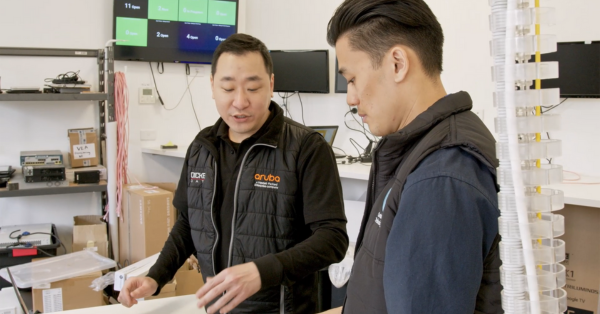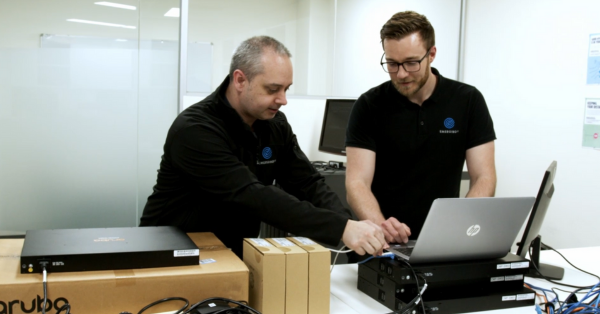Can you keep your people safe as they return to the office? That’s a question most businesses are considering as COVID-19 restrictions start to ease and employees prepare to make their way back to physical workspaces. And while many organisations have already prepared some sort of social distancing or split-teaming plan, adhering to it – with some form of contact or location tracing to ensure compliance – may seem a lot more challenging.
That’s not necessarily the case. We’ve already begun helping businesses install contact tracing systems that don’t take too much time or investment to deploy. With infrastructure like Aruba Central and the right access points, businesses can not only bring their people back to the office with peace of mind, but keep them safe even if conditions change.
Why do we need contact tracing?
Contact and location tracing will likely play a key role in most businesses bringing their people back to the office. An effective contact tracing system not only identifies who an individual has been in close proximity with if they fall ill, but also tracks their movements in and around different parts of the physical workspace – guiding efforts to disinfect or seal off certain areas if need be.
Location tracing systems, for their part, allow operations teams to see areas of high people traffic within the workspace, which can inform everything from cleaning patterns to strategies that minimise bottlenecks or larger gatherings. Along with contact tracing systems, they can also help gauge whether people are complying with back-to-work plans – seeing how many people are showing up to the office each day, for example, or whether they’re gathering in greater numbers than policy dictates.
COVID-safe, smart, and simple
Contact and location tracing don’t require complex infrastructure or huge costs. Organisations using Aruba’s access points and cloud-based network management platform, Aruba Central, can now tap on new proximity tracing features and spin up contact tracing very quickly.
How can an organisation manage something as complex as contact tracing through their network? Aruba’s access points, for one, come with several features that make contact tracing much easier – like support for not only Wi-Fi, but also Zigbee and Bluetooth Low Energy (BLE) connections that provide telemetry data on connected devices. They’re also equipped for sophisticated data analytics that can identify and differentiate between the different devices moving around at any given time. It’s worth noting all data remains under the organisation’s ownership and, by default, devices on the network aren’t matched to specific individuals’ identities – maintaining rigorous privacy control while allowing for fast tracing should the need arise.
Aruba Central, for its part, can pull that telemetry data from the network’s access points into a single data lake, where it’s then filtered and analysed to draw out insights on how the owners of the devices are moving about and who they’ve come into contact with. That telemetry data gives up to 10 metres of accuracy – more than enough to identify trends like the most heavily-frequented spots in the office, or which teams might have come into contact with a sick individual. And with Aruba Central’s new proximity tracing feature, IT and HR teams gain next-day visibility of all tracing data, allowing for a swifter response to any potential infection risk.
Get your people connected
The only thing IT and HR teams need to remember about this approach is that employees must be connected to the wireless network for contact and location tracing to work. That shouldn’t be too difficult since Aruba’s infrastructure comes with a reputation for seamless connectivity and ample bandwidth – simple encouragement to log onto the Wi-Fi network should be more than enough.
Businesses with existing Aruba wireless infrastructure and Aruba Central don’t need anything else to take advantage of its contact and location tracing capabilities. If you don’t currently power your networks with Aruba, get in touch with the team at Dicker Data and we’ll help you get started. It’ll certainly help turn your back-to-office plans into operational peace of mind.









